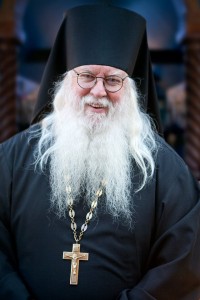
The fact that we Orthodox do not accept the doctrine of original sin as espoused in the West, does in no way suggest that we do not need to be born again (born anew). We believe, as did the Early Church Fathers, that we inherit only the results of Adams sin, not his guilt. This is known as ancestral sin because the sin of our first parents, Adam and Eve, resulted in our inheritance of death, sickness and an inclination toward evil. Christ’s death on the cross has its power, not in an atonement sacrifice, but in the conquering of the power of death. Death is trampled down by death.
It is by Christ’s resurrection that a way was made for us to be transformed by contact with the Living God, thus becoming his children by adoption.
Although we do not refer to ourselves as “saved”, as do Evangelical Christians, we nevertheless believe that we are in need of salvation. (We believe salvation is a process.) Our understanding of sin in an ancestral way, which is distinct from the concept of original sin and the hereditary guilt that required, consequently, a substitutionary atonement-type of sacrifice, separates us doctrinally from Western Christianity.
Had there not been a fall, the Second Person of the Holy Trinity, the Logos (Word) would still have incarnated into the flesh and taken on our nature. For it is by this condescension by our Creator God to take on the nature of that which He created that we are given the opportunity of being deified (Saint Paul said we shall become as gods).
Our journey into the heart culminates in theosis, whereby we are joined in everlasting communion with the very God Who created us. Saint Athanasius of Alexandria said, “The Son of God became man, that we might become god.” In II Peter 1:4, we read that we have become “…partakers of divine nature.” Saint Athanasius further says that theosis is “becoming by grace what God is by nature.”
Abbot Tryphon

This seems to be a caricature of the West:
“This “state of deprivation of the original holiness and justice … transmitted to the descendants of Adam along with human nature” (Compendium of the Catechism of the Catholic Church, 76) involves no personal responsibility or personal guilt on their part (cf. Catechism of the Catholic Church, 405).”
Found http://en.wikipedia.org/wiki/Original_sin.
I am Orthodox, but I am having trouble really understanding the difference. The West-baiting doesn’t seem helpful to me. So what, again, is the difference between Original Sin and Ancestral Sin?
Thank you for this succinct explanation.
The atonement sacrifice angle on Christ’s death is part of how He trampled down death by death.
Blachernae-Constantinople AD 1157 takes this for granted when it corrects an error that had cropped
up and stipulated that Christ’s sacrifice was not only to The Father but to Himself and to The Holy Spirit as well.
“Synod of Blachernae, in Constantinople local Synod, 1157 AD
Convened regarding Basilakes and Soterichus. Condemned those who say Christ offered His sacrifice to the Father alone, and not to himself and to the Holy Spirit; those who say the sacrifice of the Divine Liturgy is only figuratively the sacrifice of Christ’s body and blood; those who deny that the sacrifice in the Liturgy is one and the same as that of Christ on the cross; those who say men were reconciled to the Son through the incarnation and to the Father through the passion; those who think the deification of Christ’s humanity destroyed his human nature; those who deny that his deified human nature is worthy of worship; those who say that, since the human nature of Christ was swallowed up into Divinity, his passion was an illusion; those who say that characteristics of Christ’s human nature (creaturehood, circumscription, mortality, and blameless passions) exist only hypothetically, when one considers Christ’s human nature in abstraction, and not really and truly.” http://mb-soft.com/believe/txw/orthcoun.htm
The difference between original sin and ancestral sin to make it simple for the one with trouble is original sin – personal guilt for Adams sin ancestral sin = guilt for our own sins, which inevitably
come to some extent as a result of our inheriting Adam’s warp in his nature he acquired from eating the Tree of Knowledge of Good and Evil ( a kind of Nietzschean beyond good and evil sort of thing and playing God combined).
However, RC often defines original sin in terms the same as Orthodox at least nowdays. Also, insofar
as we sin we consciously or unconsciously agree with Adam in his sin, so by agreement become partly guilty of his sin like accessory after the fact. That is how I see it.